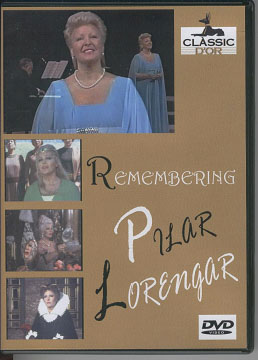
Pilar Lorengar: Zaragoza Concert on the 18th of February 1988
Songs and arias by Vivaldi, Gluck, Haendel, Mozart, Dvorak, Respighi, Mompou, Obradors, Granados, Catalani, Puccini, Wagner, Verdi, Asenjo.
Miguel Zanetti: piano.
DVD Classic d’Or 100103 (116 minutes).

To celebrate her sixtieth birthday Lorenza Pilar Garcia Seta returned to her home town of Zaragoza to give a long concert (27 numbers) that was duly recorded on video (and not of the best picture quality as everything looks a bit washed out). It was an “art” programme with Dvorak’s Zigeunermelodien (the perennial favourite ‘Songs my mother taught me’ included) and a lot of Granados and other Spanish composers with a bit of Respighi squeezed in while one wonders why the soprano in the middle of the programme suddenly sings the short Dona Elvira arietta (1’31”) of Don Giovanni’s first act. Lorengar was of course well known for her vocal longevity. I dare anyone who is not intimate with the soprano’s art to guess at which age the artist recorded this recital. Judging from the girlish freshness in the vocal delivery, the sure footedness in the attacks most people will think of a soprano in her best days, say her thirties. Lorengar admirers (and there are many) will of course immediately recognize that the personal and fluttery vibrato, not much appreciated by some adversaries and liked immensely by admirers like myself, has now mostly disappeared. The voice is maybe more disciplined, more straight but has lost a bit of its charm and warmth. Once more however one understands Lorengar’s appeal. She sings with taste and yet with vocal strength. Her long German years have not reduced her to a copier of the German school of affected singing so obvious in Schwarzkopf and Fischer. Lorengar remains an operatic soprano first and brings her full voice to most of the selections. Maybe some people will complain but her admirers will be happy with her full blooded interpretations and after all she is celebrating on her home turf. Fine though she is in Dvorak it is obvious that she never succeeded 100% percent in mastering German so that her pronunciation always sounds somewhat woolly. The moment she can switch to her own language or to Italian she is clearly more at ease and sounds more involved and convincing as in her Granados songs. Till the end of her too short days she sang Wally and Butterfly as an encore and many a spectator was probably waiting for it. Her Butterfly is especially fine as the voice combined the youth of the character with the necessary vocal strength.
Most opera lovers will maybe directly try the bonus completely devoted to opera and Verdi’s Requiem. They will be somewhat disillusioned as the picture quality of the first four numbers is even more whitewashed (a consequence of the state of technology at the time which still didn’t know how to deal in preserving video instead of film). That tells us that the original images probably were recorded somewhere at the end of the seventies, beginning of the eighties (no dates are given). But is immediately clear that the arias are synchronized as most are rich reconstructions in full costume in the open air and with a lot of extras. The one aria from a zarzuela (what a pity) and the soprano solos from the Requiem are sung live and date somewhere in my opinion from around 1985. All in all, there are not too many video sources available for this magnificent and sympathetic soprano and we have to be grateful for this one.
Jan Neckers, Operanostalgia